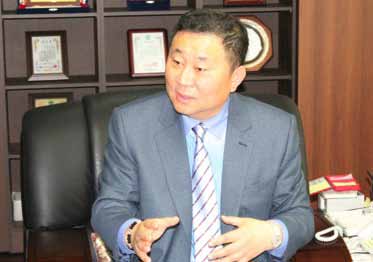 | ▲CEO Kwang Jin Park |
| |
Biofiltration is a relatively new pollution control technology. It is a technique for the elimination of odorous gas emissions and low concentrations of volatile organic compounds (VOCs).
Offensive smells and foul odors originating from chemical plants, pulp and paper mills, pharmaceuticals, cosmetics, electronics and agri-food industries causes public nuisance and triggers complaints from affected residents. To make matter worse, long-term exposure to these gases can even cause negative health effects.
Thus, the demand for odor and air pollution control systems that provide nuisance-free, breathable air is constantly growing. Recently, biological waste air treatment processes called biofilteration have gained
popularity in controlling VOCs, since they offer one of the most economically and environmentally friendly methods of air pollution control compared to conventional air pollution control technologies for industrial and municipal airstreams.
Biofilteratizon has emerged the most cost effective option for controlling odors, volatile organic compounds, hydrogen sulfide, and other hazardous air pollutants. One of the primary benefits of biological odor control is that it has much lower operating and maintenance costs than carbon, chemical scrubbers, or thermal oxidizers. Biofilteration utilizes microorganisms to remove contaminants; therefore it does not require frequent, repetitive purchases for storage. Also, because the product does not absorb the contaminants, it does not require frequent removal, disposal and replacement as required with carbon systems. Biofilteration is as effective as thermal oxidation but without the high energy consumption costs. While the use of biofiltration in the United States is not wide spread, hundreds of these systems are successfully operating in Europe, Netherlands, New Zealand, Germany, Japan, and Korea. Since its establishment in 1992, South Korea based Hanki Industrial Co., Ltd. (CEO Park, Kwang Jin) has focused its resource and attention to create a clean environment for future generations. For the last 20 years, Hanki has been developing a range of bioreactors and biofiltration systems which offer the safe and effective destruction of a wide range of commonly used solvent contaminants and malodorous compounds. With many years of extensive research, joined by the prestigious RAS Institute of Biochemistry in Moscow, Hanki has developed and has been successfully operating BIOCAT, a bioreactor using multiple microorganisms which oxidize and decompose odorous materials and VOCs into the harmless materials.
Compared to other similar bioreactors in the market, BIO-CAT has many advantages
• Provide high efficiencies in removal odor and VOCs by applying multiple microorganisms
• Provide competitive capital cost with low operating costs when compared to traditional technologies
• Require less spaces
• Automated operating and monitoring system
• Longer life time expectancies by using high quality material
• Customized solutions for clients need and process requirements
In an interview, Hanki’s CEO Kwang Jin Park said, “We are an environment and sustainability focused company. Based on our proprietary bio-filter system, BioCat, we design and supply bio-filter systems to remove hydrogen sulfide, ammonia, mercaptans and other malodorous compounds with up to 95% efficiency.”
Springer, revered German publisher who specializes in science, says Bio-Cat provides “High quality at a low cost” in the world market. Our deep knowledge in chemistry and biology, coupled with understanding of customer requirements, equips us with the expertise to integrate a broad range of technologies to deliver customized solutions to every unique situation. It means we incorporate efficiencies into our product designs. We help our clients extend the life of their equipment by supporting them with equipment upgrades and rebuild with optimization services. We help our clients realize the lowest lifetime cost of ownership. With over dozens of patents and certifications in our portfolio, we will create solutions for a cleaner environment as well as increased productivity for our clients. Our technologies have been applied to a range of processes including waste treatment, food processing, chemical manufacturing and more. We won’t stop to create new trends and develop new products for our clients.
Also, applications for VOC control have just become popular and we welcome to join with global forces in developing and researching for more advanced products.” Hanki Industrial Co., Ltd. has installed and has been operating successfully in more than 70 sites in Korea including the municipal government of Seoul and companies like Samsung.
Hanki Industrial Co., Ltd.
CEO Kwang Jin Park
www.hanki.co.kr
Email: hanki@hanki.co.kr
Int’l. 82.2.2177.8800
|